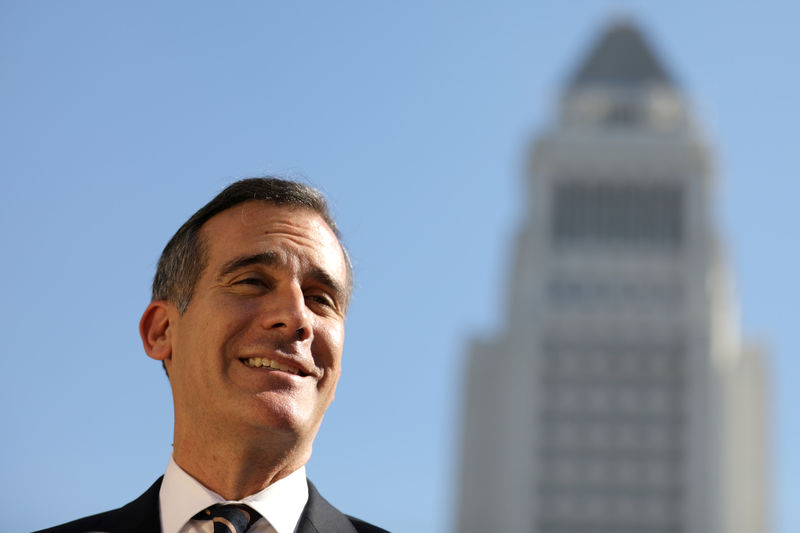LOS ANGELES (Reuters) - Los Angeles Mayor Eric Garcetti appeared within striking distance to clinch re-election as leader of America's second-largest city on Tuesday against 10 lesser-known challengers, most of them lacking significant financial support.
Garcetti, 46, a former City Council member and urban planning expert seeking his second term as mayor, needs to win at least 50 percent of the vote plus one in order to avoid a May run-off race with the second-place finisher.
A recent Loyola Marymount University poll found Garcetti backed by 50.1 percent of registered voters, compared with 7.9 percent for his closest rival, Mitchell Schwartz, a political operative of former President Barack Obama during his first White House campaign.
But the telephone-and-online survey of 950 people, conducted in January and early February, showed 38.5 percent were still undecided. The poll has a margin of error of plus or minus just over three percentage points.
Schwartz, 55, has seized on the city's rising crime rate and soaring housing costs, while warning of a looming pension fund crisis, in his bid to unseat Garcetti. The mayor has touted his successful support for a measure to raise the minimum wage in Los Angeles and pointed to the city's employment gains in the aftermath of a nationwide recession.
Garcetti enjoys a significant funding advantage, reporting his campaign has amassed more than $3.8 million as of March 1, while Schwartz, the only other candidate to have raised substantial cash, is expected to have spent $790,000, a spokesman said.
Schwartz was previously best known as the California state director of Obama's presidential campaign in 2007 and 2008. Before that he served as director of communications at the State Department during President Bill Clinton's first term in office.
Garcetti, who defeated then-city Controller Wendy Greuel in a run-off four years ago, is the son of former prosecutor Gil Garcetti, whose office tried O.J. Simpson for murder, and lost, while serving as Los Angeles County district attorney.
Drawing almost as much attention, and far more money, in Tuesday's municipal elections was the highly contested ballot Measure S, aimed at limiting development by halting "spot zoning" amendments to the city's General Plan for two years.

Measure S supporters say spot zoning permits granted to wealthy real estate interests have spurred runaway construction of high-rise office space and other costly developments that increase congestion and drive up housing costs. Opponents say the measure would go too far and actually undermine city efforts to create more affordable housing.